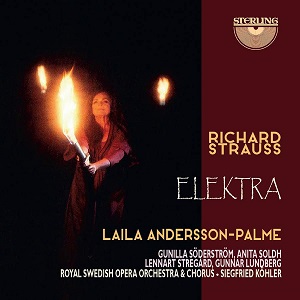
Richard Strauss (1864-1949)
Elektra (1906-08)
Elektra – Laila Andersson-Palme (soprano)
Klytämnestra – Gunilla Söderström (mezzo-soprano)
Chrisothemis – Anita Soldh (soprano)
Aegisth – Lennart Stregård (tenor)
Orest – Gunnar Lundberg (baritone)
Royal Swedish Opera Orchestra & Chorus/Siegfried Köhler
rec. live, 4 May 1996, Kungliga Theatern (Royal Swedish Opera), Stockholm. ADD
German libretto with English translation
Sterling CDA1867/1868-2 [2 CDs: 109]
I was intrigued that this “stage recording” is analogue in origin, but is still very clear and vivid – so much so that on the first playing while wearing headphones with the volume on high, I nearly had a crise cardiaque when it started with a piercing shriek from Elektra. Unfortunately, though, the orchestra quite often dominates and even wholly masks the singers’ voices – which is presumably down to microphone placement.
This was celebrated Swedish hochdramatische Sopran Laila Andersson-Palme’s farewell to the stage at 55 years old. Jokingly dubbed “Meine kleine Birgit Nilsson” by a German director, she does not have the laser intensity of Nilsson’s top notes but her stamina and penetration are much in evidence – and she successfully sang Brünnhilde, too. Her voice is still in good condition, especially its centre, even if the occasional top note is snatched or rather thin and she occasionally seems to “mark” a high note as if saving her voice, but for the most part she sings powerfully and in a manner which constantly suggests her total derangement. She is especially touching in the extended lyrical passage after Orest has revealed himself to her, singing with great tenderness, floating and making a beautiful crescendo on the top B-flat on “erhabenes Gesicht” (noble face) – and her singing there is complemented by sublime orchestral playing.
Anita Soldh makes an unusually rich, dark-voiced Chrisothemis, rather matronly – but it is she who wishes to have hearth, husband and children like any normal gal as opposed to being the miserable sister of an axe-wielding lunatic trapped in the most dysfunctional family in Ancient Greece. In the last scene, she and Andersson-Palme sing their hearts out in their frantic, final duet and tumultuous applause deservedly ensues.
Gunilla Söderström is a persuasive Klytämnestra; it is a gift of a role for a strong, low mezzo with good dramatic instincts; unfortunately, much of her earlier singing is obscured by loud orchestral playing, presumably the result of her positioning on stage, but we clearly hear the passage beginning with her haunting “Ich habe keine guten Nächte” with its tripping, mocking accompaniment, aping the clank of her jewellery.
Gunnar Lundberg is a strong, saturnine Orest – one of the best I have heard, with all the requisite qualities: enigmatic, noble and menacing. The Recognition Scene is searingly dramatic, culminating in that wonderful line, “Die Hunde auf dem Hof erkennen mich, und meine Schwester nicht!” (The dogs in the courtyard recognise me, yet my sister does not), eliciting Elektra’s exultant cry of “Orest!”
Lennart Stregård is a suitably craven, repellent Aegisth. The serving maids are a characterful bunch with three nice, fruity lower voices and a powerful fifth maid (beaten for her sympathy towards Elektra); the weak link is the voiceless, shrieking Overseer.
The orchestral playing is first-rate, as is the conducting – never rushed but invariably tense and propulsive. The scene in which Orest enters the house and kills his mother is riveting; is there a more chilling yet diverting line in opera than Elektra’s “Ich habe ihm das Beil nicht geben können!” (I couldn’t give him the axe!)?
The provision of a libretto with an English translation is an unexpected bonus – even if it is the quaint, archaic work of music critic Alfred Kalisch, rendering some of it rather risible.
There are four big cuts in this live performance, all to Elektra’s part: the first in her long monologue in which she describes how Orestes will return to avenge their father by killing Klytämnestra, before the announcement of Orestes’ supposed death; the second in her appraisal of Chrisothemis as having the strength to commit murder; the third when she is trying to force her sister to be her accomplice; the fourth in “Ich glaube ich war schön” (I think I was beautiful). The texts are still in the libretto, though, which is complete. The strangest cut is the whole of the gruesome little episode when Aegisth’s face should appear at the small window screaming “Help! Murder!” We get the orchestral cacophony but then go straight from his entering the palace to Elektra’s cry of “Agamemnon hört dich!” (Agamemnon hears you!).
Despite the disadvantages of this recording – the big cuts, the poor balances between the voices and the orchestra and a few vocal failings – this conveys all the thrill of live theatre which sometimes eludes studio recordings. I cannot recommend it as a first choice for those reasons but it is a treasurable document commemorating a fine career in a first-class performance. (For a more conventional recommendation, I refer you to my survey of Elektra.)
Ralph Moore
Help us financially by purchasing from



Other cast
The guardian of Orestes – Anders Lorentzson (baritone)
The confidante – Carina Morling (soprano)
The trainbearer – Eva Pilat (soprano)
A young servant – Sonny Wallentin (tenor)
An old servant – Bengt Lindberger (bass)
The overseer – Jadwiga Koba (soprano)
First maidservant – Inger Blom (contralto)
Second maidservant – Anna Larsson (mezzo-soprano)
Third maidservant – Carolina Bengstsdotter Ljung (mezzo-soprano)
Fourth maidservant – Agneta Lundgren (soprano)
Fifth maidservant – Hilde Leidland (soprano)


















